#like. it would be uncanny valley for humans to look at him (and knives)
Photo
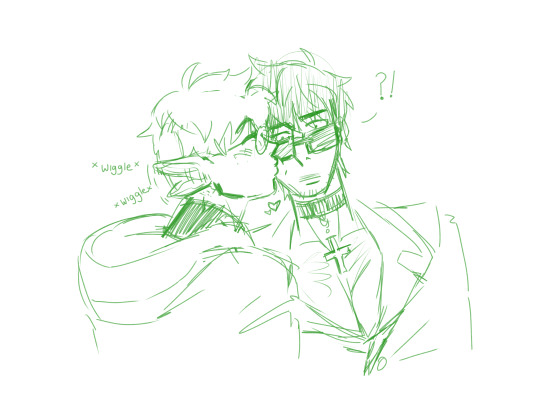

no cool
#trigun#trigun stampede#trigun fanart#vashwood#vash the stampede#nicolas d wolfwood#fan art#artists on tumblr#digital art#sketch#doodle#my art#i understand vash looking more human#but its such a pet peeve of mine when nonhuman characters are literally just a person 😭#like wdym vash is a plant. he is literally a blonde dude#i try to draw vash with unnaturally big eyes too#like. it would be uncanny valley for humans to look at him (and knives)#but it really doesnt come across that way LMAO#just big blue ass eyeballs#BLUE EYED STARE
298 notes
·
View notes
Text
Hmhmmm hm spinning trigun swap!au around in my head like barbies in the michealwave
instead of Vash’s act of stabbing Rem when she stopped him from hurting himself post-Tesla sending him down the path of peace and love, it fucks him up and makes him realize how “fragile” Rem and the other humans are compared to he and Knives. Cue him trying to actually divert the ships from Gunsmoke entirely under the idea that they should all just live in space in cryosleep forever bc it’s “safe”. Knives still causes the fall but it’s accidental due to the squabble of him trying to stop Vash. Knives would in no way be the hero type canon Vash is, but he’d probably end up a neutral force just wandering the planet avoiding Vash and trying to help the plants (but also keeping people away from Vash in ways that are totally not him doing good deeds for humans, nope, absolutely not.)
Look, benevolent intentions from an uncanny valley iron fist swap!Vash with the end goal more of less being a no free will human zoo is way scarier to me personally than Knives’ canon betrayal/grief/fear/anger driven villainy. Swap!Knives’ driving force would still be fear driven, but manifested instead in him pushing a belief of independence/free will > everything else.
please imagine with me swap!Vash’s last hail mary to try and get Knives on his side being him “resurrecting” Tesla. Somehow pulling her corpse back together and using his own energy to bring her to “life” but she came back wrong. Much closer to a living doll than an actual conscious person. The ultimate example of where they differ in opinion of free will: this Tesla isn’t alive in Knives’ eyes because she cannot make conscious choices, she’s perfect in Vash’s eyes because she can’t stray from his “protection”.
Also Livio should be Knive’s Wolfwood because I said so. Legato and Elendira his Meryl and Milly? idk
#im on a ‘hey what if vash but unsettling’ kick rn can u tell#long post#trigun#vash the stampede#knives millions#millions knives#hahns speaks#trigun spoilers
46 notes
·
View notes
Text
365: June 4
It was late. Shin was pretending to sleep so Wolf would sleep. It wasn't working. With a sigh he opened his eyes. "Can't sleep?"
"No," she said, curled up next to him.
Shin lit his hand up to bathe the room in warm Solar Light. "It's real late," he said.
"I know. Can't sleep," she apologized.
"Magpie, what time is it?" he called to his Ghost.
"Little after Hunter's Hour," he called back.
"So most everything is closed," Wolf said quietly with a frown. "It's daylight on the other side of the planet," she added helpfully.
"I know a place that's open," Shin said. "If you wanted to go out and do something?"
"Yes," she said. "It's... quiet in here. You know?"
"I get it," he assured her, turning his face to her. "It's why I prefer the night sounds of the wilderness." He lightly rubbed their noses together, making her smile. "Easier to shut your brain off with the sounds of night in it." She nodded in agreement.
"Can we go?"
"Yeah," and he sat up.
Ghost turned on the lights as they got out of bed and pulled on some clothes. No armor, no suites. He grabbed her hand as they left her apartment and headed out of the Wall. "Where are we going?" she asked him.
"A nice bar," he said. She made a face. "It's basically Hunters only and this late at night it's probably empty."
"If it's open."
He chuckled. "Joshua stays open until dawn so his clients have a place to come when it's late," he assured her.
They transmatted down from the Tower to the City and Shin led her through the empty streets of Wall Haven. All the buildings were dark and even the street lights were dim. The City really did sleep after hunter's hour except for the explicit night clubs and bars but they were few and far between. They walked past a single food vendor hidden under a golden light of his stall. There must have been a night club around that let out late.
"This better not be some seedy place, renegade," Wolf teased Shin as they walked down to the basement entrance of Light Bright.
"Please. I have some class," he scoffed.
"Debatable," both Wolf and Ghost said. Magpie made an amused noise. He shot Magpie an annoyed look but his Ghost ignored him.
The sign on the door said Light Bright in brass inlay and Shin pushed it open. Joshua had lowered the lights for the hour of night but it was as Shin always remembered. Three booth tables and a shiny bar top with a fully stocked shelf of alcohol behind. Pleasant music played softly over speakers. The bar itself was warm, welcoming. Shin had been coming here for, literally, centuries. He'd had his first drink he didn't hate here. There were two hoods at the bar. One looking into their glass, the other on their pockit. Neither of them bothered with the opening of the door.
"This is nice," Wolf said quietly as Shin pulled her over to one of the booths. The backs of the booths were high to give you privacy and the leather seats were comfortable. The tables had been replaced a few years ago because they were new. Usually they had to be replaced once a decade or so because Hunters couldn't help but test their knives on the wooden surfaces. Shin had too once, when he was young.
"I told you it was nice," Shin said. "The proprietor is Joshua-7, his face is... something. Just be aware," he advised.
"Like face mods? Savant has face mods I've seen them."
"Mmm, sort of?"
Joshua came over after a few minutes letting them get comfortable. Wolf did her best not to stare. Shin was used to Joshua's fucked up face. He was an EXO but had his face painted in a very good imitation of a human's face that was absolutely creepy in an uncanny valley way. Shin had heard some of the other patrons describe it like he'd stretched skin of a face across his own metal one. Shin thought those people were stupid. "Shin, what a pleasant surprise. At this rate you'll be a proper regular," Joshua said with a smile because he did also have facial mods to make his face more expressive. He set Shin's usual amber drink down on a coaster in front of him. "And who's your lovely friend?"
"My girlfriend, Kass," Shin said.
Joshua was good and heard all sorts of Hunter stories and tall tales but Shin was still smug when he looked absolutely shocked. "Oh my," he looked at Wolf in surprise. "Well welcome to Light Bright, Miss Kass. I am Joshua-7, what can I get for you?"
"Mmm, I don't really drink," she said. "So I don't know what's good. What did Shin get?" and she leaned over to him.
He pulled his glass away as he was about to take a sip. "You don't want this," he grunted.
"Is it bad?"
"It's real strong," he said and took a sip. It was warm and tasted like a shot to the back of the throat but the aftertaste in his mouth was all vanilla and cherry somehow. It burned all the way down as he swallowed it.
She pouted at him. "No worries," Joshua said. "I'll make you something."
"Hmmm-
"Trust me. It'll be good," Shin told her. "Joshua's a magician."
"Alright," she allowed.
"She's a light weight," he added to Joshua.
Joshua chuckled politely, "I figured. Just like that last one you brought, Shin," and he left them.
"Last one?" Wolf asked him.
"I brought Crow here when he was working too much," Shin said. "Kid drank himself stupid."
"Oh! Was that the night you were tipsy?"
"Mhm," he toyed with his glass.
Wolf leaned against him. "I didn't mind that. You're a cuddly drunk."
"Not hard when my girlfriend's so cute," he said, turning to her so their hoods cast them both in shadow. But he did feel Wolf's face heat up slightly.
"You come here often?"
"When I'm in the City yeah," and he pulled away so they were two people once more. He took another sip of his drink. He never asked Joshua what it actually was but he assumed it was some sort of whiskey. It was just what he always had. "It's quiet here and I can drink without someone asking for my autograph."
"Important," Wolf agreed and he moved his arm to be around her when she leaned against his side. "It's your vibe."
"Yeah."
"Now it is," Magpie said. "He had to grow into it."
"Ugh, so annoying," Shin batted at his Ghost in annoyance.
Wolf giggled. "Oh what? Were you a party animal back in the day?" she teased him.
He didn't answer as Joshua came back with a cocktail in a tall and elegant sling glass. "Here you are, Miss Kass," Joshua said setting the drink down on a coaster. The cocktail was almost the same blue color as her skin with several spherical ice cubes and Joshua had put some sort of edible glitter into it to make it shimmer.
"Oh wow," she leaned forward to take it. He waited politely while she took a sip and Shin smirked when she looked at the drink in surprise. "It's delicious," she said.
Joshua smiled. "Excellent. Please enjoy," and he left them to their drinks.
"What'd he give you?"
"Try it," she offered him the glass. He just let her hold it up to his lips. It tasted like... was that mango? It somehow tasted entirely like mango with a dark sugar bite of some dark rum and yet it was blue.
"That's pretty good," he said.
"It tastes like one of the first drinks I ever had with Cat years ago," she said, taking another sip. "I was just a few days old and they had me try a bunch of nectar juices."
"Joshua just knows this kinda stuff. He's never made someone a bad first drink," Shin said. "But it's got some heavy rum in it, don't drink it too fast," he advised when he saw her take a big gulp.
"Oh- right," she set the drink down. Shin took another sip of his own drink.
They didn't talk but it was fine. Comfortable. One of the Hunters at the bar left after an hour or so. By then Wolf was almost sitting in his lap, legs over his thighs, pressed against his side, with her pockit out watching Crucible highlights. Shin was watching what she was watching. It was some lower bracket stuff. Always funny to watch Guardians who weren't the best players since they always did insane and sub optimal plays. He had his arm around her waist and was comfortable with her like that.
Wolf finished her drink and a few minutes later Joshua appeared with another. It was different though. This one was orange and magenta at the bottom with some sort of muddled herbs or fruit on the bottom in a highball glass. He also had a new drink for Shin. More of his usual. He took the two empty glasses away just bidding them to enjoy their drinks.
"He's nice. Freaky. But nice," Wolf said.
"Mhm," Shin said, hand curled lightly around the old fashioned glass. Less to drink out of it and more to play with it. He was starting to get tired. "After we finish these lets go back home hmm?" His finger trailed around the rim of the glass.
"Getting tired?"
"Lil bit. How about you?"
"No," she frowned and he frowned back.
"Well I do know what would tire you out," he said, hand around her waist sliding down to her butt briefly. She just flushed and pushed him away. They still weren't having sex. Which was fine. It only worried Shin in the back of his mind when he had nothing to think about because before he'd left Wolf had been all over him. If not every day it had been a near thing. He let her take a drink of her cocktail before pulling her back against him. "Okay," was all he said quietly. "How's this one?" he asked after her drink.
"It's good. It..." she closed her eyes and took another sip, "tastes like how it sometimes feels to use Solar. Here," she let him try it. The drink was cinnamon and berries with some sort of flavorless alcohol. But she was right. In a strange way it did almost taste like Solar. Warm and bitter, the type of drink you'd want on a cool day. Or maybe one at the end of a hot summer day to have the heat of the cinnamon let the heat linger in your mouth.
He glanced over at Joshua at the bar where he was making a drink for the Hunter still on their stool. "Didn't realize Joshua was a romantic," he said looking back at Wolf and her pockit.
"Hmm?" she asked, purple eyes curious.
"Well I'm the most famous Solar Hunter in the City. And you're my girlfriend," he said as the only explanation he needed. He grinned when she blushed. When she looked away shyly he just reached over and touched her jaw making her turn back to him. "I wonder what he'd make me if he knew you were the Young Wolf, hmm?" he asked her and that made her blush even deeper. He kissed her lightly.
"You did it again," Ghost sighed at him.
Shin chuckled. "Yeah, I know," he said because Wolf was too flustered to keep talking and just bowed her head, holding her face in both hands.
"You're terrible," Ghost huffed.
"Yeap," Shin said easily and took a sip of his drink and leaned back in the booth. Wolf got herself in order after a minute and she took a big sip of her drink before leaning against his chest. "Magpie, what time is it now?"
"Almost five in the morning," he said quietly from somewhere above them.
"Okay," he gently ran his finger against Wolf's arm as he sat there. "Once we finish you want to get breakfast? That waffle place you like in the Tower?" she nodded against his light jacket.
"Should we tell Joshua?" Ghost asked.
"Nah. He doesn't make a drink until you finish the first."
Shin pulled out his own pockit to keep himself awake and Wolf slowly finished her drink. Eventually hers was empty. The other Hunter had left. The bar was finally going to close as dawn was quickly approaching. Shin knocked back the rest of his drink and started to get up. Magpie left enough purple glimmer on the table to be an ammo charge. Way overpaying but you did at a place like this. "Lets go get breakfast," he said as he helped Wolf out of the booth.
"Okay. I'm hungry."
"Wow, for once? Amazing," he teased her. She gave him a look and he just kissed her on the cheek.
"Have a nice rest of your day Shin, Miss Kass," Joshua called after them like he had the other two Hunters. Shin just raised a hand slightly to indicate they'd heard before they left the little bar.
#365#writeblr#writblr#fanfiction#destiny#destiny 2#destiny the game#the young wolf#shin malphur#young wolf#ShinWolf
12 notes
·
View notes
Note
dude hear me out on the mpreg aliens bc it gen makes sense for them and I am going to explain this cause it’s kinda cool idk?
ok look as a space faring species population groups are small or non existent, so kn order to avoid dying out they had to adapt to semi asexual reproduction.
The mechanics of it I could go into intensely cause it’s something a lot of my other species use if they’re spread over a wide area. To put it simple and without making it WEIRD: one member of the species has both ingredients for la child, but forcing these two ingredients together requires external actions ah la the demonic tango from hell either by yourself or with others. Or surgery. Or a lot of things actually depending on species, some guys kinda just grow little plants literally it’s like jellyfish. Anyways, to keep genetic variation since not having that is bad, the species of aliens (I’m calling them gorpos but obv that’s not gonna be their official names) can co create with other species that are similar to them. By similar, I mean neuron number to body mass (the reason why humans are so… human… is because we have a large number of neurons in compared to our mass). This is just to avoid any freaks making shit I don’t want them too.
anyways, this process mixes genes and then sometimes mpreg happens wether or not someone has a womb in the relationship (or we get Yuri but like… hyenas…) because the Gorpos come from these small, like jelly looking eggs, if you’ve seen a mermaids purse (which I used to collect the fuck out of) like imagin that but it doesn’t have the horn things and it’s clear because baby gorpos are translucent. Little guys.
The other thing is that like… Gorpos are like just as if not more intelligent as us, some of them just have like a thing for breeding… or mpreg… idk their their own guys they can be whatever they want to
Anyways cannibalism-
that’s another neat thing for them but first ima talk about how their mouths are set up. First thing is their tongue curls, it’s like a probiscus but it’s got this really really thin needle (basically, if they wanna exchange a language or information, they fucking French each other and stick this needle in each others brains, some can do this across species. Freaks) and it’s very sensitive. Two, their mouths are absolutely full of fucking knives. Evolution kinda fucked them over on this one, that’s why they gotta keep their tongue curled up. Three is if you see one with its mouth visible outside of feeding, run. Basically if they see something that looks like them with a visible mouth or no antenna, it’s their uncanny valley since that means something is BERY wrong (Junko).
ok so they very much are built for eating raw meat literally, and that’s what they do. Cannibalism occurs when a whelp is exposed either during the parents pregnancy or after birth in intense levels to ethereal energy. All gorpos have ethereal energy (call this god energy), and those with increased amounts turn to cannibalism to get more. This gets them closer and closer to ascension. Izuru was probably forced to cannibalize at first, but ethereal energy is more addictive than heroin so at a point you can’t stop. Once ascended, they are a god. Now this cannibalism thing actually isn’t odd for gods, who only feed on each other, like dog eat dog literally, but for most species this ain’t good. It’s not healthy either because cannibalism can have many long term health problems both mentally and physically.
izuru strong but at what cost… WHAT COSTTTTT… freakiness that’s the price.
also cannibals tend to give themselves more teeth, what I’m saying is that Izuru gotta be careful giving Makoto kissu so he doesnt hurt him.
Oh, I'm firmly in favor! You don't have to defend mpreg aliens against me, I promise! I would accept it if it was just for fun. (And you also don't have to avoid getting weird. We're all weird. 😊)
The neuron number to body mass thing is a really interesting way to distinguish the viable species. And I like the "If the mouth is visible, you should be afraid" thing and what it implies about how they would interact with/perceive humans. (Kind of like smiling being taken as a sign of aggression because baring teeth, etc.)
This is a cool AU! Avid supporter of Izuru "Mouthful of Knives" Kamukura rights.
0 notes
Text
dabihawks youtuber au
im just gonna put down all my ideas for my dabihawks youtuber au on here!
channels:
Hawks - 3rd most subscribed, gaming/makeup/reaction videos! Profile picture is just a selfie and his channel banner is probably a shitty meme.
Dabi - Honestly his personal channel he just does whatever the fuck he wants. Guitar vids? Check. Cooking vids? You got it. Arson? Graffiti? :)
Toga - SFX makeup, like blood and stuff! Also she has the ability to like replicate a real person with her makeup, she’s really good it’s almost uncanny.
Shigaraki - He is a gamer. He’s not AS popular as Hawks but he’s gained a lot of traction because he’s famous for raging. (Would he have one of those really annoying dubsteb intros? You know what I’m talking about?)
Twice - Definitely a comedy channel, Mr. Compress - Magician, Spinner - Knive tutorials, Magne - Funny skits
Kurogiri - He has a channel that shows tutorials on special effects and video editing but he also mostly helps edit everyone else’s stuff when they need it.
THE LEAGUE OF VILLAINS ALL HAVE THEIR OWN CHANNEL,,, they review videos, do illegal shit, and just have a fun time. it’s actually pretty popular,, not in the top ten but they have a pretty dedicated fanbase <3
All Might - #1 channel! He is a motivational pep speaker.
Endeavor - He’s....#2 (though uh not for long ;)) He does gun videos and at some point just,,, a ton of apology videos.
Midoriya - An analyst channel! He’s very good at figuring out how the workings of Youtube work, and he’s known for his extremely cultivated theories that are basically 100% proven with all the sources he sites. Midoriya is very smart ;3 I think because he likes All Might so much he’d also want to do some motivational stuff too
Todoroki - Crack theory channel. “Is Midoriya All Might’s illegitimate child?” is an actual video. Midoriya and Todoroki are friends and they collaborate a ton, though it’s mostly Midoriya disproving Todoroki’s theories >U<
Bakugou - he explodes EVERYTHING on his channel. bread, tables, he explodes explosions.
Kirishima - He’s a channel that tests the durability of things and how long they can withstand certain things. he teams up with Bakugou a lot to see if his items can withstand his explosions.
Ochako is a space channel and Tsuyu is a frog channel!
Bakusquad DEFINITELY has their own channel where they just get into shenanigans!! Kaminari and Sero both share their own personal meme channel and Ashido does makeup and clothing hauls and all that <3
Best Jeanist does jeans.
Momo has a ton of tutorials on how to make things from scratch and Jirou does a lot of covers (and also originals)
The Iida’s all share a channel where they give positive mental health talks and they also just. Go fast. Tensei is a memelord while Tenya is,,, Tenya <3
SO BASICALLY THE WHOLE THING Starts off with excerpts from Hawks video kind of? He’s playing...Stardew Valley :3 And they are reviewing his channel because he’s literally the #3 most popular youtuber!! Shigaraki is watching his gameplay, and he’s played Stardew before, so he’s kind of just giving tips…? They’re also kind of making fun of Hawks because that is what they do. Kind of. The League is making offhand remarks about it, and finally Dabi’s like “he’s hot” and everyone just stops. And then they all laugh and Dabi just shrugs and is like “i said what i said.”
We cut back to Hawks thinking of video ideas when he starts getting a lot of notifications on Twitter. His followers are tagging him saying the LoV made a video on him, so Hawks gets the idea to react to their video! He watches their videos actually... and knows that they do illegal activities… but he doesn’t really care in this AU. They aren’t really hurting anyone!
So Hawks does the video, and he gets to the part where Dabi calls him hot and he’s caught off guard. So how does he react? He looks straight into the camera and is like “hmu on twitter ;)” except in human speak.
Memes are (obviously) made showing Hawks reaction and Dabi catches hold of it and is like “okay” and literally texts him on Twitter! So they text for quite a while...some of it snark, others genuine conversation, and borderline flirty (? yeah)
So!!!! They eventually agree to do a collab…:) except they don’t know what kind of collab. Dabi suggests Hawks appear in one of the LoV’s videos and Hawks agrees like the gamer he is.
So they do that collab (stupid stunts !! ofc) and Hawks finds himself having a lot more fun than usual. And yeah then the rest is just shenanigans and eventually… getting together ;)
Obviously there will be a lot of conflict because...duh. I don’t really have a lot of arcs planned out but I have one (1)!!!
Occasionally there will be snippets of the other channels as well!!! Kind of as intermissions.
I really am looking forward to writing this,,, it’s gonna be social media/actual fic and i really hope i can make it and finish it.
#dabihawks youtube au#txtpost#bnha#dabi#hawks#dabihawks#shigaraki tomura#himiko toga#toga himiko#spinner#magne#kurogiri#long post#longpost#twice#all might#endeavor#endeavore#midoriya izuku#todoroki shouto#todoroki touya#bakugou katsuki#kirishima eijirou#uraraka ochako#tsuyu asui#iida tenya#iida tensei#best jeanist#yaoyorozu momo#jirou kyouka
115 notes
·
View notes
Note
What was Deidara’s reaction when he saw Sasori’s real body for the first time? Or how do you think it was?
Hmmm- the exposure of the scorpion has two stages- his surprisingly youthful face, and then, his puppet body- so I’ll briefly cover both. I’m in desperate need of some sleep, so this might be a tad bit sloppy, and i apologize.
I would imagine Sasori’s ‘face reveal’ was pretty anti-climatic for a young Deidara at best; for having a bulky, frightening impression as Hiruko, the blonde might’ve been anticipating something more behind the curtains. Or, perhaps, he had already speculated that Hiruko was merely a decoy for intimidation, and made the correct prediction, thus his reaction is him clarifying his thoughts (‘I knew it.’). Despite the dry approach, I would assume Sasori’s puzzling cherub-like, youthful appearance might raise a few unknown questions, even unusual discomfort, within Deidara. The unnatural sheen of the skin (from polishing/preservative), the soft whirring of limbs- his unbending, almost glassy hazel stare, seemingly infinite in its depth.
‘–Wait, he’s what, now? He doesn’t look that old to me. My age, almost. Hmph… Why does he always have to be so mysterious? -and why do his eyes freak me out…?’
The puppet body is another matter. Off the top of my head, widened azure eyes, taken aback from the sudden reveal— and then, once again, a drop of expectancy. Well, of course, Sasori’s one with his creations. He knows that his partner is just as passionate as he is in the transformation sense of artistry. the young artist empathizes with Sasori’s desires through the goal that, one day, he would too, become a masterpiece- a grand explosion of transient beauty and chaos, in this case, parallel to the scorpion’s embrace of eternal cables and cords.
Yet, again- that odd discomfort lingers once more, rising in intensity, as new matters to fear are present. Throughout their partnership, there had always been a rising suspicion that the puppetmaster was off. holding something more, hiding something mystical from the public eye that made the blonde rather weary. And now, in the limelight, former secret affairs become strikingly blatant; segmented limbs, sharpened knives, bladed wings, a dangerous coil- a beating heart at his core. The essence of the uncanny valley Sasori possessed, in all its brutal rebellion against humane reasoning, was unnerving.
Needless to say, it made for some comical but clear stress, specifically in the dark. Such as, Deidara, after making an early morning trip to the kitchen, attempts to head back to his room, too tired to flip any light switches- only to run into the sight of a mannequin standing on the other end of the hallway— making for a rather sleepless night. or another time, where Sasori’s head flipped all the way backwards one mission and forgetful Deidara almost has a stroke.
Now, it was not terrifying enough to make Deidara run away in fear (unless the scorpion became greatly agitated). Our energetic arsonist, perfectly calm even with stolen arms and severe injury, is definitely no coward, of course. However, since the realization, the blonde now viewed his partner entirely as the mannequin he really was- in other words, he could not unsee.
-
off topic hot take: Sasori does these ‘im a creepy puppet living in your nightmares’ stunts on purpose because he’s an absolute sadist and would absolutely take advantage of everyone’s apparent phobia of the uncanny valley for his own personal benefit. dear travelers, at 3 am- be weary… be weary… the twink is lurking
☉ ‿ ☉
(distant rattling)
(confused co-worker screaming)
#breaking news: local twink mannequin strikes fear in the hearts of civilians with his magical puppet powers#'i dont know officer i was just walking and sudden there was this midget with a knife'#will the town ever get away from the lurking gnome? the worst is yet to come. Sockori; Channel 666 news#sasori headcanons
34 notes
·
View notes
Text
You Can’t Go Home Again: An Analysis of Resident Evil VII
I'm comin' home, I've done my time
Now I've got to know what is and isn't mine
If you received my letter telling you I'd soon be free
Then you'll know just what to do
If you still want me
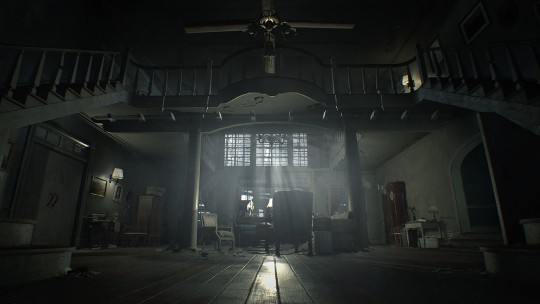
Introduction
Resident Evil VII is deceptive. Resident Evil, as a series, is deceptive. Numerous spinoffs and unnumbered entries turned the franchise into a tangled mess of intersecting characters, monsters, and conspiracies.
From the original trek through the Spencer mansion to the bombastic high-stakes setpiece-fest that is RE6, Resident Evil, after three console generations, had descended into itself, becoming bloated and seemingly incorrigible, impossible to nail down and define.
REVII was positioned as a return to form. Like the original Resident Evil, it is a straightforward story set in a spooky house, starring an inexperienced protagonist, Ethan, there with a simple but sympathetic and relatable mission: Rescue his girlfriend and get out. But REVII can’t help but dip into massive conspiracy as it navigates through what should be a relatively easy-to-digest story.
As Ethan searches for the missing Mia, who was away on a, get this, babysitting job, he encounters the deranged and inhuman Baker family, who have been granted a twisted immortality. There’s a pervasive black goo simply referred to as the Mold that seems to be infecting the family and their estate, spawning undead creatures and giving the Bakers supernatural powers. It’s not long before Ethan himself is infected, too.
The game then becomes a series of fetch-quests and races to various Macguffins as Ethan hurries to assemble a cure for himself, Mia, and their newfound ally, the Bakers’ daughter Zoe.
Resident Evil VII is a game running from its own past. As a linear narrative, it works fine, but it works better as a mood piece, a love letter to American horror films. It is meant to emulate a series of tropes and conventions. It's the product of two cultures—East and West— colliding head-on, and as a result it feels disjointed, dissonant, and yet wholly unique, fascinating, and, ultimately, compelling.
Resident Evil VII is an allegory for itself. It is a battle for the series’ soul.
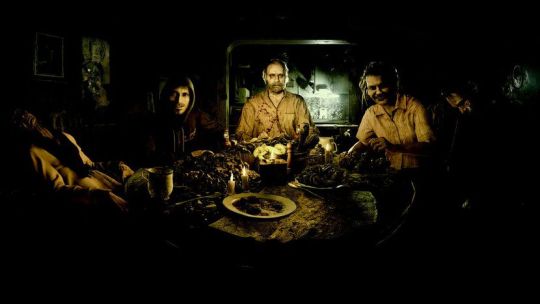
Aesthetics
Let’s get one thing out of the way first: Resident Evil 7 is not concerned with realism. It’s about simulating a horror movie; recreating their grit, visuals, and mood. In this way, it is a simulation of a simulation, and it leans heavily on the history and conventions of the American horror film without ever fully understanding them. You see this in direct, 1-for-1 tributes, such as the chainsaw fight with Jack that evokes Evil Dead 2, or the Saw-like machinations of Lucas Baker’s deathtraps, or the body found in the basement corner in the Derelict House Footage tape, positioned just like the victim in Blair Witch Project. And practically the entire front-half of Resident Evil 7 is pulled straight from The Texas Chainsaw Massacre.
This is par for the course for the Resident Evil series. The first game was a pretty standard take on haunted mansion horror, with some limited ventures into ‘80s action films, casting STARS as the badass special forces team in way over their heads a la Predator or even Aliens.
Resident Evil has always been about taking American horror and action tropes and sort of sifting them through Japanese culture. It is a imitation of American conventions, and it works precisely because it is so imperfect. Its dissonance happens to work perfectly for the mood of the genre. There’s something unsettling about how the details are just off; Louisiana looks like a still frame from an episode of True Detective, but it’s still evocative of how Americans perceive the swampland. Little mistakes regarding the area’s history and culture—the strange references to football, the inaccurate Civil War uniform—make things uncomfortable and strange. It’s like taking an English sentence, running it through Google translate into Japanese, and then translating it back into English again. Some general meanings are there and you may even be able to gleam some sense out of it, but it has lost all context and syntax and turned into something that isn’t quite English and isn’t quite Japanese—something that occupies the space between, something that has become a totally unique method of communication, with its own new signifiers and meaning. That’s Resident Evil. And that may explain a bit of the franchise’s ongoing identity crisis, too.
On a more surface-level reading, the aesthetics of REVII are vastly different from those of its predecessors, an approach to horror that’s a bit brighter but no less terrifying than previous entries. Remember, VII tells us, sunlight casts deeper shadows than darkness. This approach to horror is largely possible due to the wonderful lighting and particle effects at Capcom’s disposal, and though their tech struggles with faces, the uncanny valley works in their favor for this particular title, elevating that otherworldly feeling of imperfect simulation.
The Baker mansion and its surrounding area are dirty, grimy, grotesque. It’s southern gothic. The word “squalor” comes to mind. They choose to live in filth. Is there something ableist and maybe even contempful towards poverty about this dehumanizing of the Bakers? Maybe, but any sort of prejudice that the designers might be preying on here comes from a degree of separation, in that their only knowledge of that context, as mentioned before, is through American horror films, through simulacra. It is seperated by multiple layers, and so I find it hard to condemn their visions of the impoverished American South as anything but pulpy horror. Whatever the case, the true antagonists of the story betray any idea of prejudice against the lower class.
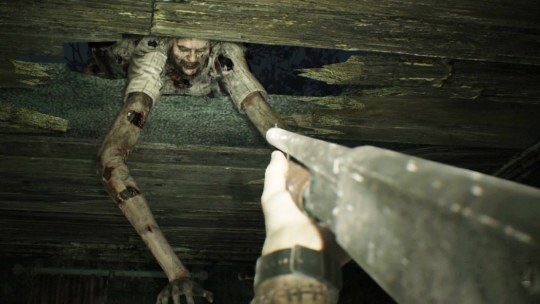
Perspective
Resident Evil 7’s protagonist is a camera. The series shifts to a first-person perspective for the first time, placing the player behind the eyes and within the mind of the game’s lead, Ethan. Despite this, the game has no qualms separating the avatar from the controller; there’s a sense that Ethan is his own character, with his own motivations not necessarily in line with the player’s.
I’ve heard the argument that what Ethan sees within the first half hour of the game would be enough to make anyone turn back. Why does he choose to go in alone? Why doesn’t he get help, or at least arm himself before he starts literally wading through corpses? No justifiable motivation could explain that.
Ethan is ostensibly motivated to look for his lost love, Mia. We’ll talk more about Mia later, but first I want to challenge the idea that this surface motivation is all that is propelling Ethan forward. Of course, you and I, and the developers, know that Ethan’s true motivation has nothing to do with Mia, and in fact nothing to do with Ethan himself, as he has no autonomy in the story. No, the motivating action propelling Resident Evil VII forward lies in the hands of the player. In a horror movie, the sort of films REVII is explicitly invoking, we can feel smarter than the protagonists. We know not to take a shower, we know not to look behind the curtain. In a horror game, we must specifically put ourselves in dangerous situations, and we do it because it’s fun. Without doing that, we can’t participate in the game. In REVII, since there is a degree of separation between player and avatar, our attention is specifically brought to Ethan’s flimsy-seeming motivation. In fact he moves forward because we push him forward, we keep him fighting. There’s a sadistic, manipulative relationship between Ethan and the player, but it’s also more complicated than that.
We sympathize with Ethan because of his love for Mia. Still, in some of Ethan’s barks and challenges to the Bakers, he expresses confusion, true ingenuity, sincerity, and a surprising and inspiring amount of courage and mettle. These motivations are enough for us to bind with Ethan, more so than in any other game in the series. Ethan is dumb, and we love him for that.
Mechanically speaking, first-person allows for some admittedly cheap but still fun jump scares, but it more importantly creates room for and necessitates an extreme amount of detail. Players can inspect drawers, cabinets, and cracks in the floorboards, unlike ever before. Monsters have a more threatening sense of scale, and so Resident Evil VII frequently plays with perspective and height, making its signature footsoldiers, the Molded, lumbering, giant masses of black knots, while also making its primary villain surprisingly pint-sized.
The first-person perspective also gives way to an effective new move, the block, crucial on the higher difficulties. The block gives Ethan a defensive verb and sort of grants the player a satisfying “cower” button. It doesn’t always make sense (how could an arm block a chainsaw?) but it paces out the game quite well against melee enemies, and it lends a visceral clutter to an already elegantly messy game screen.
Speaking of visceral—the new perspective’s greatest strength is probably the way it facilitates body horror. In RE7, you’ll have limbs chopped off, knives driven into your ribcage, and horrible masses of crawling grubs shoved down your throat. It’s a very personal, intimate horror, one that wants to gross you out while it makes your controller shudder and vibrate in resistance. It brings the player deeper into the shell of Ethan, and it creates a atmosphere of trapped, hopeless dread.
In a way, Resident Evil has been grasping at this perspective since its inception; think of the first encounter with a zombie in the first title, how the game shifts to Jill or Chris’s eyes, how the undead slowly turns to face you, its rotted mouth stuffed with human brain. This moment of body horror was essentially our introduction to Resident Evil’s mood. The perspective in Resident Evil VII, and our mouth being stuffed full of rotten flesh as we watch on, helplessly, brings the whole thing to a complete circle.
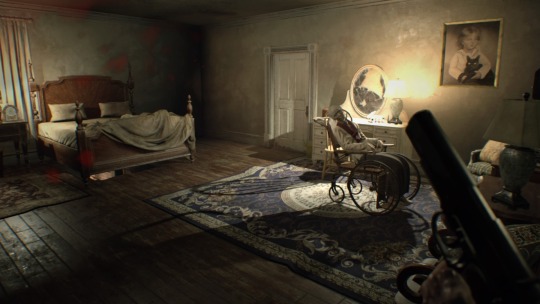
Kinetics
The movement in Resident Evil VII is deliberately slow, almost plodding. There’s a sense of weight to Ethan and his actions, necessitating such things as the aforementioned block button as well as a dedicated turn, a verb that is becoming more and more common in triple-A games, it seems. There is a sprint button, but there’s no real way to get Ethan to break out into an actual full-on run, ironic considering the urgency of the situation he’s in.
You could hand-wave away his plodding speed by saying it has something to do with his recent infection, but the Resident Evil series has always inhibited its protagonists in order to simulate the physical ramifications that fear has on the body. Despite arming the player to their proviberial teeth, early RE games aren’t about player empowerment; they still want to be a struggle to survive. So the series balances its arsenal of weapons by inhibiting the avatar’s movement. This is of course subverted in Resident Evil 4, further dismantled in 5, and completely out the window by the time 6 rolls around, but 7 is, again, intended as a return to form, and so we see a slower pace to all of Ethan’s movement. It makes up for the increased precision in aiming that the first person perspective allows.
REVII’s movement and control schemes are nowhere near as innovative and revolutionary as RE4’s over-the-shoulder controls or even RE1’s tank controls. But they still work remarkably well, and this is largely due to how the environments are designed to accommodate them. RE7 is filled with little nooks and crannies that demand careful consideration. Most of the time, they’re empty, but they are so discomforting they feel like intrusive negative space. A quick-turn button means that you always have a way to quickly glance over your shoulder. It creates a paralyzing set of blindspots to the player’s immediate left and immediate right.
Some of the guns in RE7 feel flimsy to fire, unsatisfying and cardboard-thin. The pistol has little weight or feedback, and despite the fact that the submachine gun is one of the most effective weapon in the game, it never really feels great to pull the trigger. It’s all just a bit too high-tech and light, and it clashes with the game’s mood. The shotgun, on the other hand, is incredibly satisfying, with a wonderful kick and a beautiful cascade of gore and blood to compliment each round. Meanwhile, swipes with the knife feel weak and desperate, appropriate as the knife will be little more than a box-breaker or last-ditch effort for the player.
I want to note how well the sound design compliments the movement in Resi 7. Each creek of the floorboard that comes with each step enhances the mood. Everything works harmoniously towards a feeling and an atmosphere, even if it isn’t, by the strictest definition, realistic. Remember, Resident Evil VII doesn’t strive for realism. It strives for a different sort of immersion, one that engulfs the player in familiar iconography rather than relatable and recognizable situations.
The puzzles in Resident Evil VII include the lock-key affairs that are synonymous with the series, though some of them work in interesting or subversive ways. Take the shadow puppet puzzles, that ask the player to rotate a certain key until it casts a shadow that fits into a mold or image. It’s clever to ask the player to think about the game’s lighting; it weaves together the environment and the objective. It draws attention to light and shadow, it takes time and manipulation. What it doesn’t quite take is the lateral thinking necessary for most of what you’d call puzzles. No, the puzzles in REVII are slave to the game’s pace, not its challenge. They give you tasks to do, things to fetch, and moments of quiet discomfort to break up the sometimes bombastic noise of gameplay.
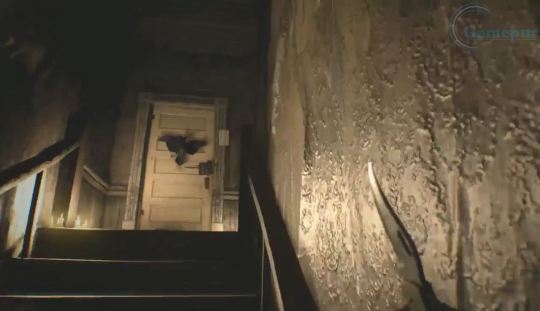
Doors
Doors play a significant role in the Resident Evil series. In the first title, they masked loading screens and acted as gateways for player progression—a lot of that game’s pacing is defined by finding and using keys. In REmake, some doors will shake and slam as you walk past them, implying that enemies are waiting for you on the other side.
But doors are also important tools for survival; each door in Resident Evil is a barrier to keep enemies at bay, because each room is treated as its own discrete environment. Zombies (mostly) can’t get through doors. If you can’t deal with an enemy or enemies, you flee towards the door and use it to place a divide between you and them. Doors are powerful mechanically and thematically in Resident Evil and REmake.
In RE7, they work in a different way. You press a button to initially crack them open, but the game makes you physically push them open as a separate action. In this way you must commit actual movement to the action of entering a room to open a door. You need to make a serious mental and physical investment in order to progress.
This is nothing short of brilliant. You can’t back away from a room after opening the door and survey it for safety before plunging in. You have to go in headfirst, and this gives the game control over moment-to-moment player progression. The doors in Resident Evil VII area synecdoche for the game’s entire design; a mindfulness in mood, movement and control that services a feeling rather than a sense of realism or accuracy.
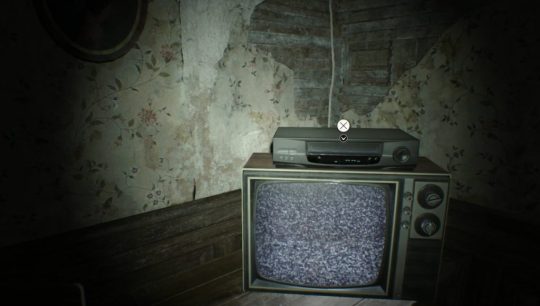
Videotapes
Resident Evil 7’s obsession with horror films extends beyond the game’s aesthetics and into its mechanics. It is fascinated with the concept of video tapes, beyond simply using these tapes as a way to evoke the mood of found footage horror. Rather, it finds a mechanical purpose for the tapes, turning them into puzzle pieces that help Ethan escape.
When we are first introduced to the videotape mechanic, it’s in the initial shack area, part of the demo that was released before the full game. The tape belongs to an unlucky film crew, working for some imaginary (but wholly believable) reality show about plumbing the depths of abandoned houses. In what is RE7’s most obvious expression of its main purpose—placing the player in a horror movie—the player takes control of the cameraman, and indeed the camera itself, and by proxy—through the method by which Ethan diegetically experiences this scene—the tape. We are the footage, and though it supposedly happened in the past, we are now controlling it in real time.
Disturbingly, the crew goes through almost exactly the same paces that Ethan went through just moments ago, and since we see how it ended up for them, it suggests that he is probably in a great deal of danger.
But the tape shows that there is a secret passage in the fireplace, one that the player could have totally missed without its aid. This establishes a pattern; the player will encounter three more tapes during their journey, and each one will convey a little more information and context to not only the player, but to their avatar, Ethan, as well. Not all of the tapes are mandatory for progression, but they are a wonderful way to present missing pieces of the puzzle to the player, through methods that are thematically appropriate and never wrestle control away from the protagonist. The tapes are essentially keys, but they are infinitely more interesting than a simple progression lock.
The most effective and interesting tape is perhaps the most well-hidden one. “Happy Birthday” is buried in a cupboard in the attic, and it is disturbing footage kept safe and secret by the Bakers’ son, Lucas.
The footage is of an elaborate deathtrap set up by Lucas, who’s positioned as a sort of genius psychopath as an in-universe explanation for some of the game’s puzzles. Lucas has captured one of the poor erstwhile documentarians, and the player takes on this victim’s perspective. Interestingly, all semblance of artifice—a camera recording the footage—drips away in favor of this perspective. Through the magic of movies, we become this character, one-step removed from our hero Ethan, yet still somehow viewing it through his eyes. If the intro tape had us jump back in time to where Ethan has been, this tape foreshadows where he will go.
Since we already know that the victim of the trap doesn’t survive, it’s not a failure to participate in Lucas’s machinations. Instead, it’s presented as the scripted, linear path that we must follow. The lethal puzzle culminates with a task that requires the victim to uncork a barrel of oil, leading to the explosion that ultimately kills the victim in the tape. But the action that springs this trap just yields a password. If one were to go into the trap with some prior knowledge of that password, one would be fine. And that’s exactly the position the tape leaves Ethan in. Since he, by way of the player and the tape, already knows the password, he’s able to escape Lucas’s trap unharmed.
This means the tape isn’t necessary for success. If the player somehow fails to find the tape, they just have to play the death trap twice. Once they continue the game and run through the puzzle a second time, they’ll realize they can just skip over the deathtrap, since they already know the password. It’s a puzzle that is proofed against stumping a stumbling player.
It also extends the horror movie motif pulsing at the heart of Resident Evil VII. It’s an attempt at creating something that the series has sometimes dabbled with, but never fully explored–the idea of elaborate, claustrophobic death traps. You’ll see spiked walls and bottomless pits in other Resi games, but never something quite so sinister and unique, not to mention devoid of enemies or threats beyond the traps themselves. It is a quiet, challenging horror, one that pits the player against themselves, and I think it’s more than strong enough to stand on its own as a full game.
The video tapes in Resident Evil VII stand hand-in-hand with the tape recorder save points and evoke a certain era of technology, a halted progress that crystallizes the Baker mansion at a moment in time, and suggests that they’ve paused their evolution. It also subtly reminds players of a time and a place, the same crucible of factors that led to the creation of the horror films that inspired Resident Evil VII. It’s a horror born out of grime and dust rather than shadows and moonlight.
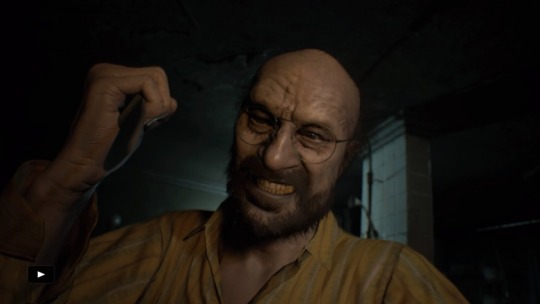
Jack
Jack is the first member of the family you encounter; you catch a glimpse of his form plodding through the woods, and he eventually kidnaps you and brings you to the centerpiece of REVII’s introduction, the family dinner, where he makes himself known as an intimidating and controlling presence.
After Jack’s pulled away by the arrival of a deputy, you escape from your binds and start to move through the mansion, but of course he quickly catches on to your plan. What follows is the most compelling, proof-of-concept sequence in all of RE7; a game of cat-and-mouse through a tightly wound series of narrow corridors, with the slow-moving but ultra-powerful Jack following you close behind.
The wing of the house that Jack chases you through is a well-thought out arena, with a few hidden escape hatches and multiple ways to double-back. It makes movement and navigation feel clever and fun, while still keeping a sense of looming dread. You’ll double-back multiple times, and you’ll always have the plan b of escaping back into the safe room on the opposite end of the hallway, as far from your objective as possible.
This scene is marked, most notably, by a few scripted scenarios designed to catch the player off-guard; one, Jack can burst through a wall and surprise the player, but only if both characters are positioned just right—some players will never even see this sequence.
It takes courage to develop entire sequences that some players will never see. It’s difficult and resource-intensive to design and place such moments in a game. But it pays off in REVII; these moments are some of the most memorable in the entire game, and you can tell a lot of care and time went into making Jack’s sequence pitch-perfect. It’s truly the highlight of the game and a Capcom more willing to take a huge gamble might have used it as the entire framework for the game. As it is, it’s the stand-out chapter in the game.
After a bit of exploration and a few confrontations, you’ll encounter the now most certainly undead Jack Baker, during an otherwise slow-paced hunt for a few statues. He catches you off-guard and the game challenges you to once again play cat-and-mouse. As a result, the entire Jack encounter sort of plays like a three-act structure in its own right; you encounter him once, run away, quiet exploration, encounter him again, more puzzles and exploration, and a final, bombastic, Evil-Dead-as-hell encounter in an enclosed space.
The fight challenges how well players have learned to navigate tight corners and small spaces while evading a slow-moving Jack. Perhaps it would have been more appropriate to present them with a cat-and-mouse challenge, one that added new wrinkles in order to act as a sort of final exam for the Jack chapter. But it’s hard to argue that this fight isn’t a trippy power fantasy for the player, and the way it flips the player’s relationship with Jack works.
Ethan has now escaped the mansion, but finds himself in the Baker grounds writ-large. The game doesn’t open up or become less linear, but it does explore some novel new locations. Unfortunately, that variance comes at the cost of some consistency. Before moving on to the next location, the player encounters a trailer belonging to Zoe, who ostensibly sets herself up as a mysterious ally. We first encountered Zoe through a phone call in the Baker house, where she warned us we were in grave danger. Zoe is not that interesting as a character, and mainly serves to complicate the game’s narrative, which starts out simply and becomes more and more complicated, to its weakness. Zoe is an element of that. She’s not well fleshed-out in the main game, and she’ll later be part of an arbitrary and superfluous player choice that feels tacked on. Here, however, she’ll play the role of mysterious sherpa for a while.
After a short break to resupply and catch their bearings, the player will soon enter the second house, the old house, and the domain of Mrs. Marguerite Baker.
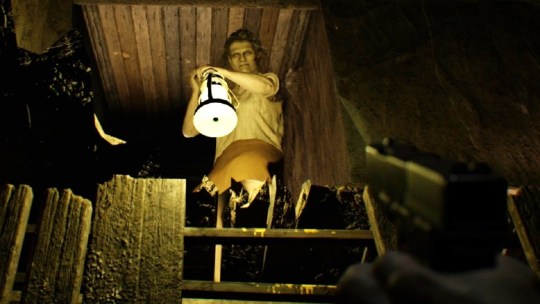
Marguerite
Pacing-wise, Marguerite’s domain is when RE7 really starts to slip in its footing. It’s not exactly bad gameplay, but it does sag a bit, and a few fetch-quests lead to the previously mentioned flamethrower and a pretty frightening if rhetorically uninteresting tape starring Mia.
Marguerite’s gimmick is insects, cockroach-like bugs that swarm Ethan, fly around the damp wooden shack, and build nests that the player must flush out using the burner. The bugs create some variance in the enemies that RE7 will throw at the player, but they aren’t terribly fun to fight. What’s more, the old house doesn’t feel quite as well-thought-out as the larger Baker Mansion, and though it also follows a somewhat circular layout, its hallways and doors are less distinct, and its rooms are less geometrically interesting.
Jack is horrifying because he feels threatening and powerful. Marguerite is horrifying because she’s unpleasant to see or hear. It’s a skin-deep horror that relies on physical reactions rather than mental ones. Marguerite is repulsive, not necessarily terrifying.
Perhaps most disappointingly, we don’t learn very much about Marguerite at all, before or after her infection. Jack gets a moment of redemption later in the game, and Lucas and Zoe are fleshed out in conversation and flavor text around the Baker estate. Marguerite, on the other hand, only gets bits and pieces of story—she’s really more about an image than a fleshed-out idea. The DLC supposedly characterizes her out a little better, and gives hints to what she was like pre-infection. There are glimpses here and there that suggest she had an affinity for religious iconography; she has a habit of creating small shrines to Eve’s “gift.” This was a potentially rich vein that Capcom could have explored in more detail to make Marguerite feel like more than just a wife and mother.
The highlight of Marguerite’s section, by far, is her boss encounter. Set in a small two-story greenhouse, the boss fight begins when she startles you by popping through a window and grabbing your legs. At this point, she has mutated into a Junji Ito-style horror, with long arms mimicking spider limbs.
Her boss arena is a work of art. While Jack’s pit is somewhat simplistic, Marguerite’s stage has a layout simple enough to grok but complicated enough to provide ambush points and blind spots. There are doors that are blocked from one side, but give the player a route to double-back. There are ceilings and walls and windows for Marguerite to crawl on and climb through. There’s ammo hidden in cabinets, but there’s a risk-reward of wasting burner ammo to open these cabinets—though the burner is the most effective weapon against the matriarch. And, echoing the gameplay in her larger domain, the boss fight is dampened by moments of quiet stalking, though here the line is blurred between cat and mouse; you’re fighting back, and if you can control the tempo of the fight you’re frequently on the offense.
There is some sexual imagery to Marguerite’s final transformation, as her weak point is a hive-womb, and she crawls around on all fours while stalking you. It’s RE taking a page out of Silent Hill’s book, and it might feel a little cheap and grotesque if it wasn’t executed with the grimy style of a western grindhouse horror flick. No, REVII has little reservations about what it is by this point; it fully accepts that it is campy gross-out horror, but never to the level of shtick. It still takes its scares seriously, and this level of sincerity lends it a lot of heart. It makes no apologies for being disgusting, and in that way it’s lovable, just like the shlock it’s based on.
After a grueling fight, Marguerite calcifies and crumbles to dust, leaving behind a lantern for Ethan, who is free to move on to the next chapter of the game.
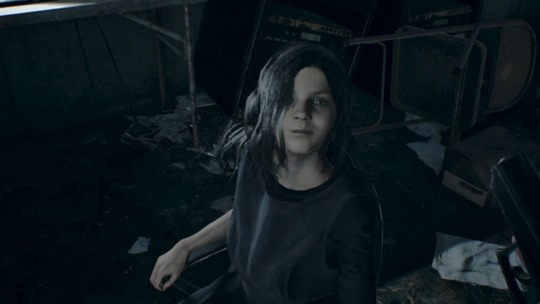
Eveline (Part 1)
But before Ethan moves on, he makes a detour to the attic and the kid’s bedroom.. Demonic children are nothing new, horror-wise, but REVII sows the seeds of its main antagonist achingly slowly, placing her quite literally right under the player’s nose while still breadcrumbing morbid story details to keep the hook. It’s not a deep story, or even all that unpredictable, but it is compelling enough to push Ethan forward.
You’ll notice I’m not paying much mind to the grand details of the plot, and that’s precisely because the story is secondary to a mood. This is why so many of its characters are so tropey. They don’t need to be real people, they need to serve a purpose.
If this is all sounding a bit harsh, let me assure you; I fully believe anything other than REVII’s broad strokes narrative would probably feel a little too fiddly and intrusive to serve what the game is trying to be. There’s just enough dressings of a compelling story to keep players interested in what’s going on, and that’s exactly the way it should be.
The Baker’s son, Lucas, plans to make you work hard to reach his lair, and as a result there’s a quick and gruesome return to the main mansion to fetch a key out of a corpse and battle some extra molded. This largely feels like filler and fluff, but it goes a long way to building Lucas up as a bit different from his parents. He’s more sinister, more cunning, more self-aware and human. You’ll also encounter Grandma a few more times, placed within the critical path, always watching and always silent.
RE has always been noteworthy for its clockwork puzzles, and the series has frequently lampshaded these puzzles in cute if unbelievable and ultimately unnecessary ways. The police station in RE2, for example, was supposedly a decommissioned art museum, as if that makes any sense.
In REVII, though, it’s the machinations of a character, the inventive, sociopathic Lucas, who, as it turns out, is a major antagonistic force behind the game’s entire plot. His reveal as the true antagonist of the game is brought on with little fanfare. It’s mostly revealed in DLC and notes. But it’s similar to Wesker’s heel-turn in RE1. It doesn’t purporte him to be the main villain of the game, but it sets him up as a possible series-wide antagonist.
Your mileage may vary out of this twist. Some might like having a face to the horror, and the stories of Lucas as a child, spying on his sister and setting traps for neighborhood bullies, are chilling in a lasting way. But the game doesn’t do a great job of selling Lucas as a planner, and the whole thing feels a bit contrived in the face of REVII’s greater narrative.
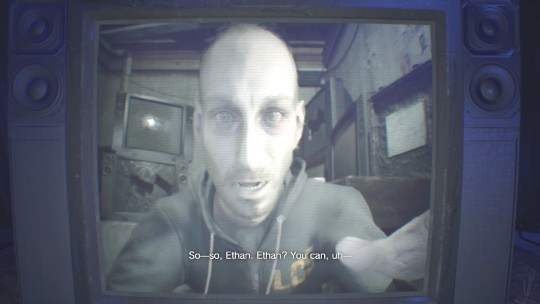
Lucas
In the Videotape section, I discussed the happy birthday tape and how it uses the conventions and structure of a video game to set up REVII’s most interesting puzzle. I briefly glossed over how the tape and Lucas as a character invokes the found footage aesthetic so important to Resident Evil VII’s style, but in the Happy Birthday puzzle—and through the rest of Lucas’s death traps—we see another piece of horror movie inspiration come to life; the complicated, convoluted deathtraps of films like Saw and Cube.
This sort of claustrophobic psycho-horror came about out of budget constraints. The first Saw was hugely influential because it allowed for an inexpensive yet wholly effective reworking of the slasher flick. It was successful commercially, and it was appealing to producers because it had the built-in simplicity of a few simple sets and some inexpensive practical effects. It was a streamlined reworking of the genre for the 21st century.
If Jack stands in for the ‘70s-era slash-fests like Texas Chainsaw, and Marguerite is a melding of ‘80s and ‘90s body horror from the West and the East, then it’s temporally appropriate that Lucas is the representative for 21st century gore flicks. In a way, REVII is a tour of the genre’s modern history, an exploration of its tropes as they evolved. It’s a love letter to three eras of horror.
Mechanically, Lucas challenges the player to stop, move slowly and deliberately, and fully assess the environment. There are tripwire bombs and spike traps littering the hallways of his home, and though you will still fight standard molded, they’re sort of a trivial threat by this point. No, Lucas demands that you think about the game’s environment as hostile and unforgiving. This is something of a change when compared to the circular, narrow hallways in the Baker Mansion and the Old house, where the game’s architecture and hidden pathways were one of your only weapons against your pursers. Here, Lucas isn’t following you, but he’s attempting to anticipate your movement. You’re not being chased, you’re being funneled.
Lucas leads you into the Baker barn, which he’s set up like a gladiatorial arena. If you needed any further evidence that the game is now fully banking on Saw homages, the hanging pig-corpses should be proof enough. This environment is incredibly quiet at first, but its architecture betrays its true nature; the intersecting, stacked hallways are layed out too perfectly for it to not be some sort of combat arena. In most games, this discord can be laughable; in Resi VII, it builds tension and suspense, and therefore works a little better than it might in, say, a pure action game or a shooter.
Depending on your difficulty, you’ll face some number of a new type of enemy, the fat Molded. These are bulky, powerful enemies who spew bile, one of the few projectile attacks in the game. Overall, they’re more intimidating than actually threatening. By this point, you’re armed to the teeth, and the barn’s layout gives you plenty of ways to obscure line of sight and take cover. But this boss encounter most vitally introduces the fat molded into the ranks of foes you’ll encounter. Resident Evil has a history of introducing powerful minions with such fanfare; they bring around a new, tough enemy type, build them up as an intimidating, powerful force, and then later seed them into the ranks once the player is more capable. It’s a way of ramping up combat challenges and creating an interesting endgame.
Next up is the happy birthday puzzle. Once you beat Lucas’s escape room, he gets angry and tosses a bomb into the room, which you can use to blast the wall and escape. By the time you make it to his control room, Lucas has already fled. There’s a short trek to the boathouse, and a fully-loaded safe room is a pretty good indicator that a big fight is about to go down. There’s a sense of finality to the proceedings, considering that you’ve now worked your way through the main Baker family. Still, there’s something like a quarter of the game left, and it’s when most people say REVII really goes off the rails. The pace and mood of the game is about to undergo a major shift. But first, it’s the final battle with Jack.
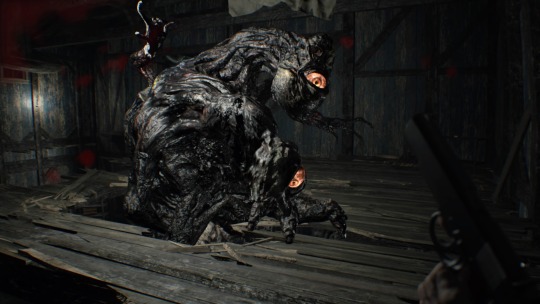
Jack’s Return
Ethan’s final encounter in the Baker residence brings his time with the family full-circle. Jack has come back from the dead yet again, and he’s mutated beyond any recognition. This is the beginning of REVII’s slide fully into the conventions of the series, away from the new-age slasher flick pastiche and into the gamey, japanese bio-horror that defines the series.
The fight with Jack is a fairly standard boss battle that asks you to shoot the glowy parts when they start getting glowy. There’s a smart sense of player-enemy placement and blocking and a clever use of levels that keep the fight from feeling dull.
The barn burns over the course of the fight, and eventually it’s all but completely destroyed. Once the fight wraps up, Jack will grab you as a final deathrattle, and you’ll be forced to inject him with one of the two cures you’ve cooked up. This means you only have enough serum to cure one other person, and the game is going to make you choose—do you fulfill your promise to Zoe, or do you stay loyal to your original mission, and rescue Mia? It’s a dull, binary, choice that simply determines the ending of the game, as well as what amounts to an optional boss fight. It’s set up to either reward or punish the player, rather than challenging their conceptions of the game’s world and Ethan’s place in it. Put simply, there’s a right answer and a wrong answer, which makes it fundamentally uninteresting.
Whoever the player chooses, the pair will then make their escape down the river.
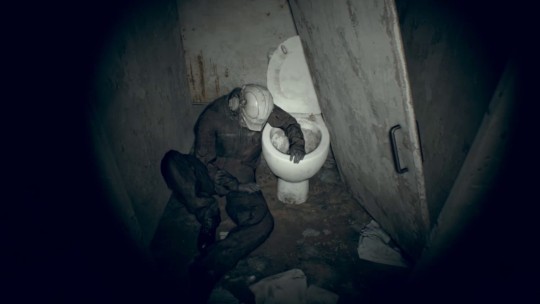
Mia and the Tanker
The boat crashes, and REVII plays its final third-act twist; a shift in perspective, moving the action behind the eyes of Mia, who is all-too-familiar with the washed-up tanker. The twist is that Mia is much more than she seemed and was hiding a few secrets from Ethan. She’s a mercenary, hired to escort a bioweapon on a commercial tanker in a covert operation. That weapon is Eveline, the main antagonist and the driving force behind the sentient Molded force that both corrupted the Bakers and created the monsters the player has battled this entire game.
This twist is nothing short of baffling. It is unexpected, but it is not a subversion of any player expectations; it’s a twist that devalues the previous rising action rather than usurping it, and it inflates the scale of the game’s conflict beyond ‘creepy house’ and into ‘international high-stakes bioterrorism.’ It’s disingenuous and exhausting, as Ethan is now relegated to a bit player in a bigger conspiracy.
All that being said—it’s Resident Evil sinking back into its traditional mold. Wesker’s heel-turn and the Umbrella conspiracy elevated the first game’s spooky mansion into a secret megascience lab. That twist set the pace for the series as a whole; a convoluted narrative rooted in a distinctly Japanese anxiety over superweapons.
Here’s the thing; I don’t think the twist is all bad, actually. I think there’s something charming about how RE feels it is so vital to create a wide, entangling conspiracy to tell such a tight and quick narrative. It’s an impulse that the series truly cannot escape, for whatever reason. It is never content to tell a story about horror on a small-scale. It needs to dip into some kind of worldwide threat in order to tie all its narrative strings together. Would REVII be stronger without the tanker chapters and the larger ramifications of its effect on the narrative? Probably. Would it really be Resident Evil without such a grand mega-conspiracy at its heart? I’m not so sure.
It’s a complicated issue, because it begs the question; how much can you mess with a series’ DNA before you have an entirely new product? Is a mood enough to connect a series, or does there need to be an underlying thread that connects all the titles to its past? Is there simply too much baggage attached to such a massive beast of a franchise for it to ever escape its own legacy?
Ostensibly, the theme of Resident Evil VII is family. It’s the driving force that causes Eveline to throw off her controllers and drive the game’s plot forward. It’s the bond that causes Ethan to go after Mia, and it's the question that Zoe struggles with as she turns against her mutated clan.
Conversely, then, it is appropriate that Resident Evil VII struggles against its predecessors and the legacy they have created. Like Zoe, it is fighting for its own identity while still maintaining a certain loyalty to its origins.
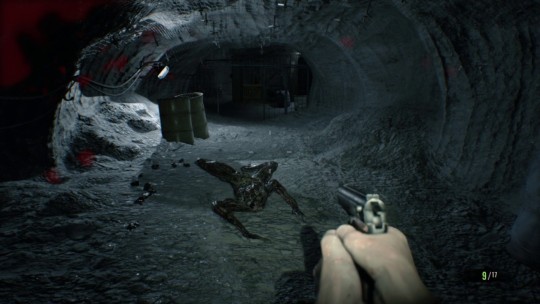
Eveline (Part 2)
The last location in the game is the salt mines, which act as a sort of final combat dungeon, overrun with Molded. Unlike the tanker, however, the salt mines afford the player a ton of firepower and ammunition. It’s all about player empowerment now, as the scales have been tipped in Ethan’s favor. Fighting the molded is now trivial.
The mine is also set up as a sort of ground zero for the Molded. There are secret labs and documents filled with research on the molded dotting offshoots and chambers.
There’s a thrilling race up a spiraling column and a few more fights with the fat Molded between Ethan and Eveline. She’s in the guest house, and this final confrontation acts as more of a cathartic emotional highpoint than a final gameplay challenge. The mines were the real final test, and though there are some small challenges to the encounter with Eveline, it’s more in position to wrap up REVII’s mood and story.
The player is now up against Eveline’s psychic powers, and it’s about as hokey as it sounds. However, the audiovisual presentation is strong enough to suck the player in, and it still feels emotionally resonant and threatening, even when dipping into the absurd.
After the player figures out how to guard against Eve’s blasts, they reach her decaying body. Like Lisa trevor in REmake, Eve is positioned as a victim of larger, sinister forces, a capitalist war machine that took a little girl and turned her into a weapon. This sympathy for the devil ultimately induces genuine pity for Eveline, and it, again, shifts the focus of the story onto a more worldwide conspiracy and less on its play actors.
Eve’s final form is massive and grotesque, but most poignantly, it is part of the house itself. The Baker estate has been Ethan’s sometimes-ally, sometimes-enemy, and it’s only appropriate that it takes a leading role for the final moments of REVII. The final set piece is one of a massive scale, and it brings attention to the sky above, where dawn is beginning to break through what has been a seemingly endless night. Evenline mutilates Ethan one more time as choppers begin to fly in overhead, and finally, a deus ex machina in the form of a massive handcannon lands next to Ethan’s head. He fires a few rounds and Eve crumbles to dust with a final deathknell.
Ethan is rescued by a man introducing himself as Redfield and working for the series’ signature villians, the Umbrella corporation, and REVII, despite itself, insists on teasing its place in the series’ overarching, complicated mythology. A brief epilogue showcases some more lovely, True detective-esque air shots of Louisiana over narration from an exhausted Ethan, before fading to credits.

Resident Evil 7 is a revisioning of the series that coined the term survival horror. It’s an invocation of a mood and aesthetic, brought into interactivity. It is a product of its technology and time, as such a detailed and intimate horror wasn’t possible even in the last console generation.
At the same time, it’s also a troubling return to form. Resident Evil can’t seem to escape the baggage of its prequels or the conventions of massive conspiracy that provides the framework for its otherwise small-scale horror. It is an antithesis to itself, as it attempts to invoke personal intimate horror through large-scale conflicts between massive capitalistic and militaristic conglomerates. A Resident Evil game will inevitably go off the rails at some point, but its mood and method determines if the player will be along for the ride. RE4 went from moody creepout to action-packed campfest, and it never missed a step. REVII stumbles a bit more, but it promises a strong return to what made RE great, especially after a few strange forays into action in RE5 and 6.
Yet REVII didn’t enjoy the commercial success of those two titles, though it did see a fair bit more critical acclaim. It’s a bold move to shift a tentpole franchise as dramatically as capcom did between RE6 and REVII, but the game is clearly a love letter to its inspirations. REVII is a celebration of Western conventions seen through a Japanese lens, It is a product of dissonance, and that’s what makes it so compelling.
Despite its flaws, Resident Evil VII is one of the best horror games of the latest generation. It provides genuine moments of horror and a piercing, inescapable atmosphere of tension and horror. It is cathartic and wild, moody and visionary, and awe-inspiring in its execution.
Maybe the next entry will lean further into the horror aspect of survival horror, and will have the courage to shake off a messy legacy of legions of the undead.
#resident evil#resident evil vii#criticism#games writing#games criticism#capcom#horror#horror games#survival horror
4 notes
·
View notes